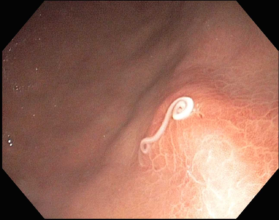A Japanese study published in The American Journal of Gastroenterology showed magnetic resonance enterography (MRE) may effectively evaluate small-bowel endoscopic healing in Crohn’s disease and predict patient outcomes similar to balloon-assisted small bowel enteroscopy (BAE). Researchers found patients who did not show small-bowel healing on MRE or BAE had a higher risk of relapse, hospitalization
Neurologic involvement in inflammatory bowel disease (IBD) is uncommon but probably underreported, and gastroenterologists must be ready to recognize it. For example, peripheral neuropathy is reported to occur in up to 13% of IBD patients. Neurologic complications due to nutritional deficiencies are thought to be even more common. Complications may arise spontaneously from the systemic inflammation
A longitudinal study in the American Journal of Gastroenterology found that elevated peripheral blood eosinophils found in the white-cell differential of blood tests might better predict the severity of inflammatory bowel disease in a subgroup of patients. “These results are very important, as we are always searching for predictors of more severe disease in order

Preparation Crucial for Adolescents Transferring to Adult IBD Care
Psychological readiness, logistical barriers, appropriate selection of adult care providers is key. See the article on MedPage here.
Shared inflammatory pathways and genetics may predispose patients with respiratory conditions to developing IBD Ever-mounting evidence is strengthening the link between inflammatory bowel disease (IBD) and immune-mediated respiratory conditions such as asthma and chronic obstructive pulmonary disease (COPD). Research has suggested that IBD and airway illnesses likely share common inflammatory pathways as well as predisposing
Safe conception and pregnancy during treatment, but also at issue: body image, sexuality, cervical cancer risk Inflammatory bowel disease (IBD), affecting approximately one in 500 people in the United States, occurs about equally in men and women. But gender-specific physiologic and psychological differences can have an impact on patient care and outcomes, especially in females
Link Between Antibiotics and IBD Remains Circumstantial Effect stronger in children, and underscores need for antibiotic stewardship in prescribing for pediatric infections Since inflammatory bowel disease (IBD) is linked to disruption of the intestinal microbiome, antibiotics have come under increasing scrutiny as possible environmental catalysts in IBD – especially if taken in early childhood. So
There is sometimes heated discussion about adherence to medical regimens being of value, both to an individual patient and to broader patient categories. Inflammatory bowel disease is certainly one of these contentious areas. Patients often seem to go from doctor to doctor, seeking out one who agrees with the decisions they have already made. Even
Infestation with benign parasitic worms is one possible explanation for the low incidence of autoimmune diseases and allergies in less developed countries and, conversely, for the sustained increase in such inflammatory conditions in more sanitized and hence “dewormed” industrialized societies. Joel V. Weinstock, MD, of Tufts Medical Center in Boston, writing in Nature in an article
About 18.5% of patients with moderate to severe ulcerative colitis experienced remission after taking tofacitinib for eight weeks, compared with 8.2% of patients taking a placebo, researchers reported in The New England Journal of Medicine. In another trial, remission was experienced after one year by 34.3% of patients taking a 5-mg dose of tofacitinib and








